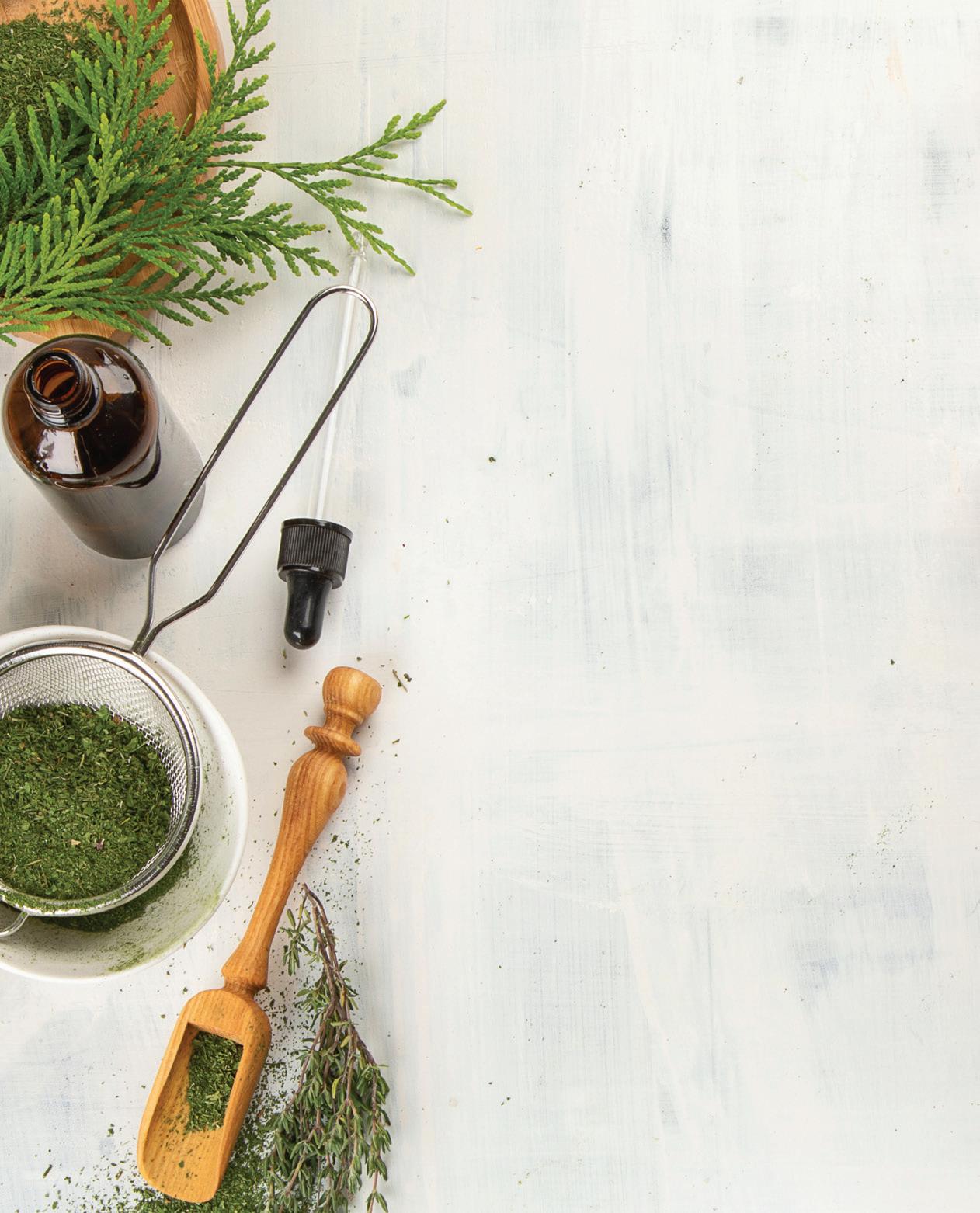
3 minute read
NATURAL PLANT MEDICINES
PLANT MEDICINE HERBAL MEDICINE + PARKINSON’S DISEASE
BY DR. DAWN HAYFORD
Advertisement
This issue of GRAM discusses the ways cannabis can help with Parkinson’s disease (PD) and its symptoms. There are also a number of other alternative treatments that can be used, oftentimes in conjunction with anti-PD medication. Plants and treatments that are neuroprotective, anti-inflammatory, and antioxidant have all had positive effects on the symptoms and pathogenesis of PD either in animal studies or through historical use that has not been clinically studied. Continue reading to discover various plant medicines that have been used to improve the quality of life for PD patients and even fight the progression of the disease.
Herbal medicine (HM) has been used to treat PD and its symptoms in China and other Asian countries. The key ingredients in herbal med- icine combinations can include up to 52 to different herbs with 59 different combinations. 1,2 A study published in 2018, listed the top 11 herbs found in traditional Chinese herbal medicine used to treat PD: danshen root, debark peony root, gambir plant nod, rehmannia root, desertliving cistanche, fleeceflow- er root, sichuan lovage rhizome, Asiatic cornelian cherry fruit, Chi- nese angelica, grassleaf sweet- flag rhizome, and milkvetch root. 1 Many studies have highlighted the various ways that HMs are com- bined and used in Asian countries. The way these ingredients are combined and the levels of com- bination are probably based on individual treatment plans, and it is likely that one specific combina- tion of herbs is not going to work for every patient. Our bodies react differently to herbs and the way they interact with each other.

A study published in 2012 iden- tified the wide range of variation in the preparation of HMs; it also identified that when used with conventional drug therapy such as levodopa, led to decreased symp- toms and adverse events and a reduction in the dosage of anti-PD drugs. 2 This study did point out that in order to get a better un- derstanding of HM’s effect on PD, there needs to be standardization of ingredients and further stud- ies over a longer period of time to study any adverse effects. 2
One such standardization of Chinese HM is a combi- nation of 8 herbs referred to as Optimized Yinxieling Formula (OYF). It has been used to treat psoriasis be- cause of its anti-inflammatory properties. These same properties were found to be neuroprotective and pre- vent neuroinflammation in mice. 3 In fact, they stopped the activation of the immune cells in the brain that cause cell death in dopamine nerve cells.
Another Asian tradition that has been used to treat PD is Ayurveda, an ancient Indian medicine practice. An- cient Ayurvedic texts appear to refer to body tremors or “kampavata.” Plant medicines used in Ayurveda to treat PD include Ashwaganda and Mucuna Pruriens (MP). 4 In fact, a recent study showed that powdered seeds of MP delivers a naturally occurring form of the anti-PD drug levodopa and provides the same efficacy as synthetic levodopa with fewer adverse effects. 5

Oxidative stress has been found to contribute to the loss of dopamine-producing cells in a specific part of the brain called the substantia nigra. 6,7 Specifically, ginkgo biloba has been studied in animals to treat PD symptoms and was found to have neuroprotective ef- fects, prevent oxidative stress, and reduce the toxicity of the anti-PD drug, levodopa. 8
It is important to note that antioxidants such as ginkgo biloba, vitamin E, creatine, CoQ10, and others have not been found to be extremely effective in treating PD in humans. The reason for this might be that the oxidative stress has already caused the deterioration and/or death of the dopamine-producing nerve cells by the time PD is diagnosed. 6 This does not discount the neuroprotective effects of antioxidants for poten- tially preventing PD in the first place.
Due to the worsening effects of PD on patients, the quality of life usually declines as the disease worsens. Using plant medicines; focusing on an anti-inflamma- tory, antioxidant diet; and cannabis use, in conjunction with modern anti-PD drugs could improve the quality of life and delay the death of the dopamine-producing cells in the brain. Ensure you are discussing any alter- native treatments with your physician.










